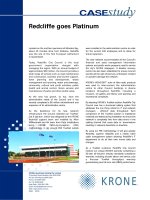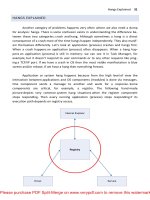Tài liệu Memory Dump Analysis Anthology- P12 pdf
Bạn đang xem bản rút gọn của tài liệu. Xem và tải ngay bản đầy đủ của tài liệu tại đây (553.5 KB, 30 trang )
Managed Code Exception 331
MANAGED CODE EXCEPTION
.NET programs also crash either from defects in .NET runtime (Common Lan-
guage Runtime, CLR) or from non-handled runtime exceptions in managed code ex-
ecuted by .NET virtual machine. The latter exceptions are re-thrown from .NET runtime
to be handled by operating system and intercepted by native debuggers. Therefore our
next crash dump analysis pattern is called Managed Code Exception.
When we get a crash dump from .NET application it is the dump from a native
process. !analyze -v output can usually tell us that exception is actually CLR exception
and give us other hints to look at managed code stack (CLR stack):
FAULTING_IP:
kernel32!RaiseException+53
77e4bee7 5e pop esi
EXCEPTION_RECORD: ffffffff -- (.exr 0xffffffffffffffff)
ExceptionAddress: 77e4bee7 (kernel32!RaiseException+0x00000053)
ExceptionCode: e0434f4d (CLR exception)
ExceptionFlags: 00000001
NumberParameters: 1
Parameter[0]: 80131604
DEFAULT_BUCKET_ID: CLR_EXCEPTION
PROCESS_NAME: mmc.exe
ERROR_CODE: (NTSTATUS) 0xe0434f4d - <Unable to get error code text>
MANAGED_STACK: !dumpstack -EE
No export dumpstack found
STACK_TEXT:
05faf3d8 79f97065 e0434f4d 00000001 00000001 kernel32!RaiseException+0x53
WARNING: Stack unwind information not available. Following frames may be
wrong.
05faf438 7a0945a4 023f31e0 00000000 00000000
mscorwks!DllCanUnloadNowInternal+0×37a9
05faf4fc 00f2f00a 02066be4 02085ee8 023d0df0
mscorwks!CorLaunchApplication+0×12005
05faf500 02066be4 02085ee8 023d0df0 023d0e2c 0xf2f00a
05faf504 02085ee8 023d0df0 023d0e2c 05e00dfa 0×2066be4
05faf508 023d0df0 023d0e2c 05e00dfa 023d0e10 0×2085ee8
05faf50c 023d0e2c 05e00dfa 023d0e10 05351d30 0×23d0df0
05faf510 05e00dfa 023d0e10 05351d30 023d0e10 0×23d0e2c
Please purchase PDF Split-Merge on www.verypdf.com to remove this watermark.
332 PART 3: Crash Dump Analysis Patterns
FOLLOWUP_IP:
mscorwks!DllCanUnloadNowInternal+37a9
79f97065 c745fcfeffffff mov dword ptr [ebp-4],0FFFFFFFEh
SYMBOL_NAME: mscorwks!DllCanUnloadNowInternal+37a9
MODULE_NAME: mscorwks
IMAGE_NAME: mscorwks.dll
PRIMARY_PROBLEM_CLASS: CLR_EXCEPTION
BUGCHECK_STR: APPLICATION_FAULT_CLR_EXCEPTION
Sometimes we can see mscorwks.dll on raw stack or see it loaded and can find it
on other thread stacks than the current one.
When we get such hints we might want to get managed code stack as well. First
we need to load the appropriate WinDbg SOS extension (Son of Strike) corresponding to
.NET runtime version. This can be done by the following command:
0:015> .loadby sos mscorwks
We can check which SOS extension version was loaded by using .chain command:
0:015> .chain
Extension DLL search Path:
...
...
...
Extension DLL chain:
C:\WINDOWS\Microsoft.NET\Framework\v2.0.50727\sos: image 2.0.50727.42,
API 1.0.0, built Fri Sep 23 08:27:26 2005
[path: C:\WINDOWS\Microsoft.NET\Framework\v2.0.50727\sos.dll]
dbghelp: image 6.6.0007.5, API 6.0.6, built Sat Jul 08 21:11:32 2006
[path: C:\Program Files\Debugging Tools for Windows\dbghelp.dll]
ext: image 6.6.0007.5, API 1.0.0, built Sat Jul 08 21:10:52 2006
[path: C:\Program Files\Debugging Tools for
Windows\winext\ext.dll]
exts: image 6.6.0007.5, API 1.0.0, built Sat Jul 08 21:10:48 2006
[path: C:\Program Files\Debugging Tools for
Windows\WINXP\exts.dll]
uext: image 6.6.0007.5, API 1.0.0, built Sat Jul 08 21:11:02 2006
[path: C:\Program Files\Debugging Tools for
Windows\winext\uext.dll]
ntsdexts: image 6.0.5457.0, API 1.0.0, built Sat Jul 08 21:29:38 2006
[path: C:\Program Files\Debugging Tools for
Windows\WINXP\ntsdexts.dll]
Please purchase PDF Split-Merge on www.verypdf.com to remove this watermark.
Managed Code Exception 333
Then we can use !dumpstack to dump the current stack or !EEStack command to
dump all thread stacks. The native stack trace would be mixed with managed stack
trace:
0:015> !dumpstack
OS Thread Id: 0x16e8 (15)
Current frame: kernel32!RaiseException+0x53
ChildEBP RetAddr Caller,Callee
05faf390 77e4bee7 kernel32!RaiseException+0x53, calling
ntdll!RtlRaiseException
05faf3a8 79e814da mscorwks!Binder::RawGetClass+0x23, calling
mscorwks!Module::LookupTypeDef
05faf3bc 79e87ff4 mscorwks!Binder::IsClass+0x21, calling
mscorwks!Binder::RawGetClass
05faf3c8 79f958b8 mscorwks!Binder::IsException+0x13, calling
mscorwks!Binder::IsClass
05faf3d8 79f97065 mscorwks!RaiseTheExceptionInternalOnly+0x226, calling
kernel32!RaiseException
05faf438 7a0945a4 mscorwks!JIT_Throw+0xd0, calling
mscorwks!RaiseTheExceptionInternalOnly
05faf4ac 7a0944ea mscorwks!JIT_Throw+0x1e, calling
mscorwks!LazyMachStateCaptureState
05faf4c8 793d424e (MethodDesc 0x7924ad68 +0x2e
System.Threading.WaitHandle.WaitOne(Int64, Boolean)), calling
mscorwks!WaitHandleNative::CorWaitOneNative
05faf4fc 00f2f00a (MethodDesc 0x4f97500 +0x9a
Ironring.Management.MMC.SnapinBase+MmcWindow.Invoke(System.Delegate,
System.Object[])), calling mscorwks!JIT_Throw
05faf510 05e00dfa (MethodDesc 0×4f98fd8 +0xca
MyNamespace.MyClass.MyMethod(Boolean)), calling 05fc7124
05faf55c 00f62fbc (MethodDesc 0×4f95f90 +0×16f4
MyNamespace.MyClass.MyMethod.Initialise(System.Object))
05faf740 793d912f (MethodDesc 0×7925fc70 +0×2f
System.Threading._ThreadPoolWaitCallback.WaitCallback_Context(System.Objec
t))
05faf748 793683dd (MethodDesc 0×7913f3d0 +0×81
System.Threading.ExecutionContext.Run(System.Threading.ExecutionContext,
System.Threading.ContextCallback, System.Object))
05faf75c 793d9218 (MethodDesc 0×7925fc80 +0×6c
System.Threading._ThreadPoolWaitCallback.PerformWaitCallback(System.Object
)), calling (MethodDesc 0×7913f3d0 +0
System.Threading.ExecutionContext.Run(System.Threading.ExecutionContext,
System.Threading.ContextCallback, System.Object))
05faf774 79e88f63 mscorwks!CallDescrWorker+0×33
05faf784 79e88ee4 mscorwks!CallDescrWorkerWithHandler+0xa3, calling
mscorwks!CallDescrWorker
05faf804 79f20212 mscorwks!DispatchCallBody+0×1e, calling
mscorwks!CallDescrWorkerWithHandler
05faf824 79f201bc mscorwks!DispatchCallDebuggerWrapper+0×3d, calling
mscorwks!DispatchCallBody
05faf888 79f2024b mscorwks!DispatchCallNoEH+0×51, calling
mscorwks!DispatchCallDebuggerWrapper
Please purchase PDF Split-Merge on www.verypdf.com to remove this watermark.
334 PART 3: Crash Dump Analysis Patterns
05faf8bc 7a07bdf0 mscorwks!Holder,2>::~Holder,2>+0xbb, calling
mscorwks!DispatchCallNoEH
05faf90c 77e61d1e kernel32!WaitForSingleObjectEx+0xac, calling
ntdll!ZwWaitForSingleObject
05faf91c 79ecb4a4 mscorwks!Thread::UserResumeThread+0xfb
05faf92c 79ecb442 mscorwks!Thread::DoADCallBack+0×355, calling
mscorwks!Thread::UserResumeThread+0xae
05faf950 79e74afe mscorwks!Thread::EnterRuntimeNoThrow+0×9b, calling
mscorwks!_EH_epilog3
05faf988 79e77fe8 mscorwks!PEImage::LoadImage+0×1e1, calling
mscorwks!_SEH_epilog4
05faf9c0 79ecb364 mscorwks!Thread::DoADCallBack+0×541, calling
mscorwks!Thread::DoADCallBack+0×2a5
05faf9fc 7a0e1b7e mscorwks!Thread::DoADCallBack+0×575, calling
mscorwks!Thread::DoADCallBack+0×4d4
05fafa24 7a0e1bab mscorwks!ManagedThreadBase::ThreadPool+0×13, calling
mscorwks!Thread::DoADCallBack+0×550
05fafa38 7a07cae8 mscorwks!QueueUserWorkItemCallback+0×9d, calling
mscorwks!ManagedThreadBase::ThreadPool
05fafa54 7a07ca48 mscorwks!QueueUserWorkItemCallback, calling
mscorwks!UnwindAndContinueRethrowHelperAfterCatch
05fafa90 7a110f08 mscorwks!ThreadpoolMgr::ExecuteWorkRequest+0×40
05fafaa8 7a112328 mscorwks!ThreadpoolMgr::WorkerThreadStart+0×1f2, calling
mscorwks!ThreadpoolMgr::ExecuteWorkRequest
05fafad0 79e7839d mscorwks!EEHeapFreeInProcessHeap+0×21, calling
mscorwks!EEHeapFree
05fafae0 79e782dc mscorwks!operator delete[]+0×30, calling
mscorwks!EEHeapFreeInProcessHeap
05fafb14 79ecb00b mscorwks!Thread::intermediateThreadProc+0×49
05fafb48 77e65512 kernel32!FlsSetValue+0xc7, calling kernel32!_SEH_epilog
05fafb6c 75da14d0 sxs!_calloc_crt+0×19, calling sxs!calloc
05fafb80 77e65512 kernel32!FlsSetValue+0xc7, calling kernel32!_SEH_epilog
05fafb88 75da1401 sxs!_CRT_INIT+0×17e, calling sxs!_initptd
05fafb8c 75da1408 sxs!_CRT_INIT+0×185, calling kernel32!GetCurrentThreadId
05fafb9c 30403805 MMCFormsShim!DllMain+0×15, calling
MMCFormsShim!PrxDllMain
05fafbb0 30418b69 MMCFormsShim!__DllMainCRTStartup+0×7a, calling
MMCFormsShim!DllMain
05fafbdc 75de0e4c sxs!_SxsDllMain+0×87, calling sxs!DllStartup_CrtInit
05fafbf0 30418bf9 MMCFormsShim!__DllMainCRTStartup+0×10a, calling
MMCFormsShim!__SEH_epilog4
05fafbf4 30418c22 MMCFormsShim!_DllMainCRTStartup+0×1d, calling
MMCFormsShim!__DllMainCRTStartup
05fafbfc 7c81a352 ntdll!LdrpCallInitRoutine+0×14
05fafc24 7c82ee8b ntdll!LdrpInitializeThread+0×1a5, calling
ntdll!RtlLeaveCriticalSection
05fafc2c 7c82edec ntdll!LdrpInitializeThread+0×18f, calling
ntdll!_SEH_epilog
05fafc7c 7c82ed71 ntdll!LdrpInitializeThread+0xd8, calling
ntdll!RtlActivateActivationContextUnsafeFast
05fafc80 7c82ed35 ntdll!LdrpInitializeThread+0×12c, calling
ntdll!RtlDeactivateActivationContextUnsafeFast
05fafcb4 7c82edec ntdll!LdrpInitializeThread+0×18f, calling
ntdll!_SEH_epilog
Please purchase PDF Split-Merge on www.verypdf.com to remove this watermark.
Managed Code Exception 335
05fafcb8 7c827c3b ntdll!NtTestAlert+0xc
05fafcbc 7c82ecb1 ntdll!_LdrpInitialize+0×1de, calling ntdll!_SEH_epilog
05fafd10 7c82ecb1 ntdll!_LdrpInitialize+0×1de, calling ntdll!_SEH_epilog
05fafd14 7c826d9b ntdll!NtContinue+0xc
05fafd18 7c8284da ntdll!KiUserApcDispatcher+0×3a, calling ntdll!NtContinue
05faffa4 79ecaff9 mscorwks!Thread::intermediateThreadProc+0×37, calling
mscorwks!_alloca_probe_16
05faffb8 77e64829 kernel32!BaseThreadStart+0×34
.NET language symbolic names are usually reconstructed from .NET assembly
metadata.
We can examine a CLR exception and get managed stack trace by using
!PrintException and !CLRStack commands, for example:
0:014> !PrintException
Exception object: 02320314
Exception type: System.Reflection.TargetInvocationException
Message: Exception has been thrown by the target of an invocation.
InnerException: System.Runtime.InteropServices.COMException, use
!PrintException 023201a8 to see more
StackTrace (generated):
SP IP Function
075AF4FC 016BFD9A
Ironring.Management.MMC.SnapinBase+MmcWindow.Invoke(System.Delegate,
System.Object[])
...
...
...
075AF740 793D87AF
System.Threading._ThreadPoolWaitCallback.WaitCallback_Context(System.Objec
t)
075AF748 793608FD
System.Threading.ExecutionContext.Run(System.Threading.ExecutionContext,
System.Threading.ContextCallback, System.Object)
075AF760 793D8898
System.Threading._ThreadPoolWaitCallback.PerformWaitCallback(System.Object
)
StackTraceString: <none>
HResult: 80131604
0:014> !PrintException 023201a8
Exception object: 023201a8
Exception type: System.Runtime.InteropServices.COMException
Message: Error HRESULT E_FAIL has been returned from a call to a COM
component.
InnerException: <none>
StackTrace (generated):
SP IP Function
00000000 00000001
Please purchase PDF Split-Merge on www.verypdf.com to remove this watermark.
336 PART 3: Crash Dump Analysis Patterns
Ironring.Management.MMC.IMMCFormsShim.HostUserControl3(System.Object,
System.Object, System.String, System.String, Int32, Int32)
0007F724 073875B9
Ironring.Management.MMC.FormNode.SetShimControl(System.Object)
0007F738 053D9DDE
Ironring.Management.MMC.FormNode.set_ControlType(System.Type)
...
...
...
StackTraceString: <none>
HResult: 80004005
0:014> !CLRStack
OS Thread Id: 0x11ec (14)
ESP EIP
075af4fc 016bfd9a
Ironring.Management.MMC.SnapinBase+MmcWindow.Invoke(System.Delegate,
System.Object[])
...
...
...
075af740 793d87af
System.Threading._ThreadPoolWaitCallback.WaitCallback_Context(System.Objec
t)
075af748 793608fd
System.Threading.ExecutionContext.Run(System.Threading.ExecutionContext,
System.Threading.ContextCallback, System.Object)
075af760 793d8898
System.Threading._ThreadPoolWaitCallback.PerformWaitCallback(System.Object
)
075af8f0 79e7be1b [GCFrame: 075af8f0]
!help command gives the list of other available SOS extension commands:
0:014> !help
Object Inspection
DumpObj (do)
DumpArray (da)
DumpStackObjects (dso)
DumpHeap
DumpVC
GCRoot
ObjSize
FinalizeQueue
PrintException (pe)
TraverseHeap
Examining code and stacks
Please purchase PDF Split-Merge on www.verypdf.com to remove this watermark.
Managed Code Exception 337
Threads
CLRStack
IP2MD
U
DumpStack
EEStack
GCInfo
EHInfo
COMState
BPMD
Examining CLR data structures
DumpDomain
EEHeap
Name2EE
SyncBlk
DumpMT
DumpClass
DumpMD
Token2EE
EEVersion
DumpModule
ThreadPool
DumpAssembly
DumpMethodSig
DumpRuntimeTypes
DumpSig
RCWCleanupList
DumpIL
Diagnostic Utilities
VerifyHeap
DumpLog
FindAppDomain
SaveModule
GCHandles
GCHandleLeaks
VMMap
VMStat
ProcInfo
StopOnException (soe)
MinidumpMode
Other
FAQ
Please purchase PDF Split-Merge on www.verypdf.com to remove this watermark.
338 PART 3: Crash Dump Analysis Patterns
In the case where .NET CLR runtime is version 1.x we might get messages point-
ing to some .NET DLL and this could be the indication that some threads have managed
code:
*** WARNING: Unable to verify checksum for mscorlib.dll
*** ERROR: Module load completed but symbols could not be loaded for
mscorlib.dll
In some cases we cannot load the appropriate SOS extension automatically:
0:000> .loadby sos mscorwks
Unable to find module ―mscorwks‖
Then we can try SOS version 1.0
0:000> !clr10\sos.EEStack
Loaded Son of Strike data table version 5 from
―C:\WINDOWS\Microsoft.NET\Framework\v1.1.4322\mscorsvr.dll‖
The following message means that the server version of CLR is used:
0:000> .loadby sos mscorwks
Unable to find module ―mscorwks‖
0:000> .loadby sos mscorsvr
0:000> !help
SOS : Help
For some crash dumps we get the following message saying that sos.dll cannot
be found:
0:000> .loadby sos mscorwks
The call to LoadLibrary(C:\WIN_NO_SP\Microsoft.NET
\Framework\v2.0.50727\sos) failed, Win32 error 0n126
―The specified module could not be found.‖
Please check your debugger configuration and/or network access
Here we need to check where Microsoft.NET\Framework\v2.0.50727\sos.dll
is installed on our crash dump analysis host and use .load command:
0:000> .load C:\WINDOWS\Microsoft.NET\Framework\v2.0.50727\sos.dll
The version of WinDbg since 6.8.4.0 and !analyze -v command show both native
and managed stack traces from .NET 64-bit application memory dump so there is no
need to load SOS manually there.
Please purchase PDF Split-Merge on www.verypdf.com to remove this watermark.
Managed Code Exception 339
Please purchase PDF Split-Merge on www.verypdf.com to remove this watermark.
340 PART 3: Crash Dump Analysis Patterns
TRUNCATED DUMP
Sometimes the page file size is less than the amount of physical memory. If this is
the case and we have configured “Complete memory dump” in Startup and Recovery
settings in Control Panel we get truncated memory dumps. Therefore we can call
our next pattern Truncated Dump. WinDbg prints a warning when we open such a
dump file:
************************************************************
WARNING: Dump file has been truncated. Data may be missing.
************************************************************
We can double check this with !vm command:
kd> !vm
*** Virtual Memory Usage ***
Physical Memory: 511859 ( 2047436 Kb)
Paging File Name paged out
Current: 1536000 Kb Free Space: 1522732 Kb
Minimum: 1536000 Kb Maximum: 1536000 Kb
We see that the page file size is 1.5Gb but the amount of physical memory is
2Gb. When BSOD happens the physical memory contents will be saved to the page file
and the dump file size will be no more than 1.5Gb effectively truncating the data
needed for crash dump analysis.
Sometimes we can still access some data in truncated dumps but we need to pay
attention to what WinDbg says. For example, in the truncated dump shown above the
stack and driver code are not available:
kd> kv
ChildEBP RetAddr Args to Child
WARNING: Stack unwind information not available. Following frames may be
wrong.
f408b004 00000000 00000000 00000000 00000000 driver+0x19237
kd> r
Last set context:
eax=89d55230 ebx=89d21130 ecx=89d21130 edx=89c8cc20 esi=89e24ac0
edi=89c8cc20
eip=f7242237 esp=f408afec ebp=f408b004 iopl=0 nv up ei ng nz ac po nc
cs=0008 ss=0010 ds=0023 es=0023 fs=0030 gs=0000 efl=00010292
driver+0x19237:
f7242237 ?? ???
Please purchase PDF Split-Merge on www.verypdf.com to remove this watermark.
Truncated Dump 341
kd> dds esp
f408afec ????????
f408aff0 ????????
f408aff4 ????????
f408aff8 ????????
f408affc ????????
f408b000 ????????
f408b004 ????????
f408b008 ????????
f408b00c ????????
f408b010 ????????
f408b014 ????????
f408b018 ????????
f408b01c ????????
f408b020 ????????
f408b024 ????????
f408b028 ????????
f408b02c ????????
f408b030 ????????
f408b034 ????????
f408b038 ????????
f408b03c ????????
f408b040 ????????
f408b044 ????????
f408b048 ????????
f408b04c ????????
f408b050 ????????
f408b054 ????????
f408b058 ????????
f408b05c ????????
f408b060 ????????
f408b064 ????????
f408b068 ????????
kd> lmv m driver
start end module name
f7229000 f725f000 driver T (no symbols)
Loaded symbol image file: driver.sys
Image path: driver.sys
Image name: driver.sys
Timestamp: unavailable (FFFFFFFE)
CheckSum: missing
ImageSize: 00036000
kd> dd f7229000
f7229000 ???????? ???????? ???????? ????????
f7229010 ???????? ???????? ???????? ????????
f7229020 ???????? ???????? ???????? ????????
f7229030 ???????? ???????? ???????? ????????
f7229040 ???????? ???????? ???????? ????????
f7229050 ???????? ???????? ???????? ????????
f7229060 ???????? ???????? ???????? ????????
f7229070 ???????? ???????? ???????? ????????
Please purchase PDF Split-Merge on www.verypdf.com to remove this watermark.
342 PART 3: Crash Dump Analysis Patterns
If due to some reasons we cannot increase the size of our page file we just should
configure “Kernel memory dump” in Startup and Recovery. For most all bugchecks ker-
nel memory dump is sufficient except manual crash dumps when we need to inspect
user process space.
Please purchase PDF Split-Merge on www.verypdf.com to remove this watermark.









